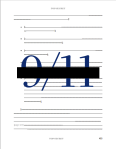
In a story published Monday, The Hill’s Martin Matishak and Julian Hattem made a very important contribution to the growing movement to declassify 28 pages on foreign government support of the 9/11 hijackers—by providing the best indication yet of the just how few members of the House have read the censored material.
According to Matishak and Hattem:
A spokesman for Rep. Devin Nunes (R-Calif.), the Intelligence panel’s chairman, said the committee granted more than 30 requests from lawmakers to view the pages in the 113th Congress.That tally is disappointing but not surprising, confirming suspicions of extremely low readership voiced by 28Pages.org in September.
Professional Curiosity in Short Supply
The 113th Congress ended its two-year run in December 2014, a full year after Congressmen Walter Jones and Stephen Lynch began urging peers to read the 28-page chapter of a joint Congressional intelligence report on 9/11.
Knowing Jones, Lynch and Massie account
for three of the “more than 30″ requests granted by the intelligence
committee during the last congress, The Hill’s report suggests that
fewer than one in ten of the trio’s peers were moved to action by these
attention-grabbing descriptions of the 28 pages:
- Jones: “I was absolutely shocked by what I read. What was so surprising was that those whom we thought we could trust really disappointed me.”
- Lynch: “These pages contain information that is vital to a full understanding of the events and circumstances surrounding this tragedy.”
- Massie: “I had to stop every two or three pages and rearrange my perception of history….it’s that fundamental.”

At a time when Congress is contemplating a new authorization of military force in the Middle East, it seems little exaggeration to say that casting a life-and-death vote on counter-terror strategy without having read the 28 pages is tantamount to legislative malpractice.
Matishak and Hattem deserve credit for providing this critical information, and intelligence committee chairman Nunes should be applauded for enabling this initial level of transparency. That said, more transparency is needed—specifically, the names of those in both houses of Congress who have read the 28 pages.
The Bright Side
While confirming our worst suspicions about 28-pages readership on the Hill, Matishak and Hattem’s report offered a measure of encouragement, too: Eight more requests to read the censored passage were approved by the House intelligence committee on Thursday.In that same week, seven new cosponsors joined House Resolution 14, which urges the president to declassify the 28 pages. With heightened media attention and increased involvement by citizens in the form of calls and letters to Congress and letters to newspaper editors, we’re confident that number will continue to grow.

